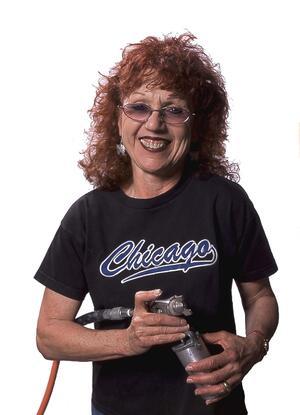Judy Chicago
My first ideas in developing imagery for the Birth Project involved using the birth process as a metaphor for creation. In 1975, I met a radical nun who collaborated with me in writing a reinterpretation of the myth of Genesis from a female point of view. I began trying to build a visual analog to this myth (as expressed in The Creation, a 14-foot tapestry), one that would affirm the fact that it was women who created life. I went to the library to see what images of birth I could find. I was struck dumb when my research turned up almost none. It was obvious that birth was a universal human experience and one that is central to women's lives. Why were there no images?
I decided that I would have to go directly to women, ask them to tell me about their birth experiences, and then use that raw material in the development of images. Many of the women I talked to had never spoken to anyone about their birth experiences. As I listened and studied and read, I realized that the very nature of this subject was shrouded in myth, mystery, and stereotype. I knew that I wanted to dispel at least some of this secrecy.
In the Birth Project, the content – birth, the essential female experience – was fused with needlework, a traditional form of women's art. From 1980 to 1985, I met and worked with the over 130 needleworkers from the United States, Canada, and New Zealand who collaborated with me on this project. Working with the Birth Project stitchers was like being in touch with one aspect of the continuum of women's history: the medieval workshops where women stitched together for the glory of the church; the all-female Renaissance guilds where women embellished royal robes; the 19th-century quilting bees where women coded secrets into their quilts. But this time, we were using needlework to openly express and honor our own experience through this unique form.
It is possible that in some future generation, child-rearing will be seen as the crucial activity of a culture, and the raising of future generations will be the most prized and rewarded profession. It is possible the time will come when both women and men will share the responsibilities of child-rearing equally. But that is not the case now. Exploring the subject of birth brought me face-to-face with the fundamental cause of women's oppression – as soon as one gives birth to a child, one is no longer free. And, tragically, that lack of freedom is reinforced and institutionalized by the very nature of society. It may be a high-school girl being deprived of an education because she becomes pregnant; a woman on an airplane desperately trying to quiet a screaming child while everyone stares at her in disgust; a long-married mother of three whose husband leaves her, her income thereby reduced to poverty level; or a highly gifted artist whose conflicts between self-fulfillment and her child's needs tear her apart with guilt. Whatever her situation, every woman who has a child is punished for having done the very thing which society tells her is her womanly goal.
Judy Chicago, born in Chicago in 1939, is an artist, author, feminist, educator, and intellectual whose career now spans four decades. Her most famous work, The Dinner Party, a monumental multimedia project symbolizing the achievements of historic women in Western civilization, has been seen by more than one million people during its 16 exhibitions held at venues in six countries. The Dinner Party was recently acquired by the Brooklyn Museum of Art, where it will be the centerpiece of the Elizabeth A. Sackler Center for Feminist Art. Her other projects include the Birth Project, Powerplay, the Holocaust Project: From Darkness Into Light (with husband and photographer Donald Woodman), and Resolutions: A Stitch in Time. Chicago has published ten books and is the recipient of four honorary doctorates and numerous awards and grants. In 1996, the Arthur and Elizabeth Schlesinger Library on the History of Women in America in Cambridge, Massachusetts, became the repository for her papers. Chicago lives in Belen, New Mexico, with her husband and their beloved cats.




